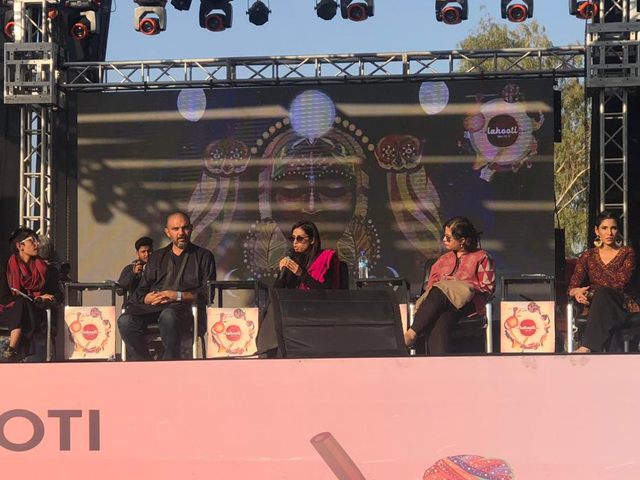
The founder of the event Saif Samejo revealed he got the idea after someone close to him opened up about being harassed by a celebrity.
"This year's Lahooti Melo was extremely tough because it revolved around a case close to my heart," said the musician. "This event is all about women. Their voices, their stories and their ordeals; celebrating women in all their glory and urging them to come forward with their tales..."
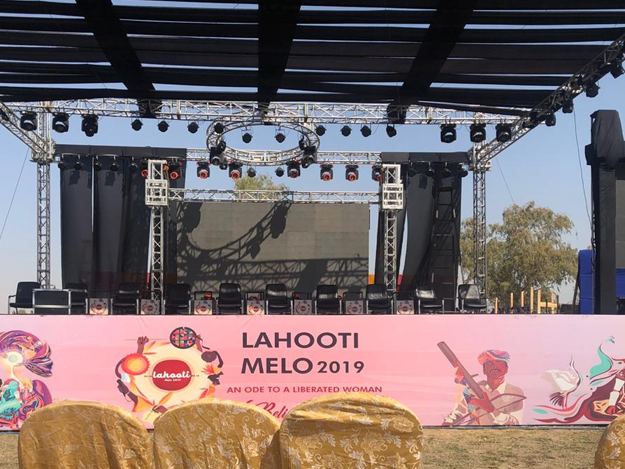 PHOTO: EXPRESS TRIBUNE
PHOTO: EXPRESS TRIBUNEMuhammad Hanif, author of The Case of Exploding Mangoes, was one of the panelists speaking on day one of the festival. According to him, it's but a ritual for festivals in Pakistan to have mostly male speakers. So the first question he asked when he was invited to Lahooti Melo was how many female speakers were coming?
"The problem with the men in our society is very basic: if you've given them a platform, they will talk, even if they don't know a thing about the topic," Hanif stated. "My only suggestion to the organisers was fundamental: bring in as many women speakers as they can since the event is all about them. I don't believe a man can decide whether a woman is liberated or not. That's only for a woman to decide."
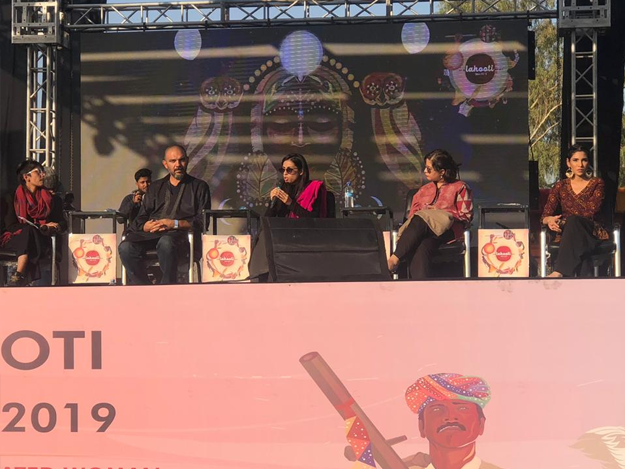 PHOTO: EXPRESS TRIBUNE
PHOTO: EXPRESS TRIBUNEKnown for being outspoken and brutally honest, Jami spoke about the larger issue in connection to the Ali Zafar v Meesha Shafi sexual harassment case. "I've stood up really crudely against the item number culture. I spoke up against selling women in our films. Ali Zafar was my very good friend. I was closer to him as compared to Meesha," he recalled. "But when Meesha came out with her story, I knew I had to support her. But unfortunately, we made the accused's film a blockbuster. I'm not someone who really weighs his words before speaking. And I did exactly that. I supported Meesha and the backlash that followed was problematic."
He added, "The point is, it is extremely hard for women to come forward with such ordeals. We don't believe them and that is what we need to change. If all the cases start to come out, majority of the showbiz industry will be in trouble."
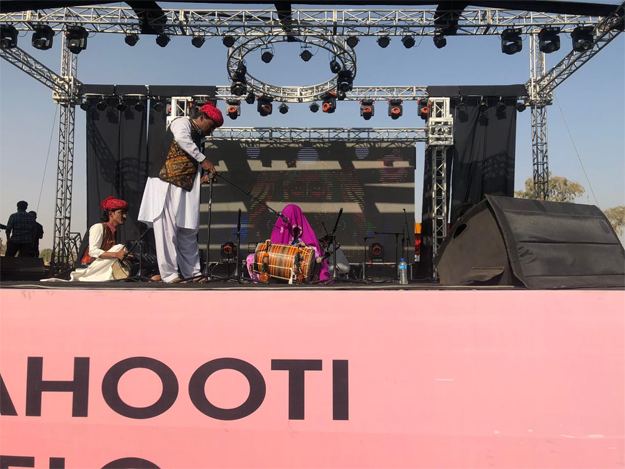 PHOTO: EXPRESS TRIBUNE
PHOTO: EXPRESS TRIBUNEAt another session, Sanam Maher, journalist and author of The Sensational Life and Death of Qandeel Baloch, discussed how she had a number of promotional events cancelled due to the subject of her book. "When Qandeel Baloch came out with her accusations against Molvi Qavi, people doubted her. Why, you might ask? Because how can someone like Qandeel say that someone harassed her? My question is this: how do you define who can be harassed or not? How do you measure that?"
Two-time Oscar winner Sharmeen Obaid-Chinoy was also present at the event. She unveiled snippets from her upcoming documentary on female freedom fighters. Herein, the film-maker will be telling the stories of women who speak up against violence, are leading elite forces in Nowshera and those who are fighting for the betterment of Pakistan.
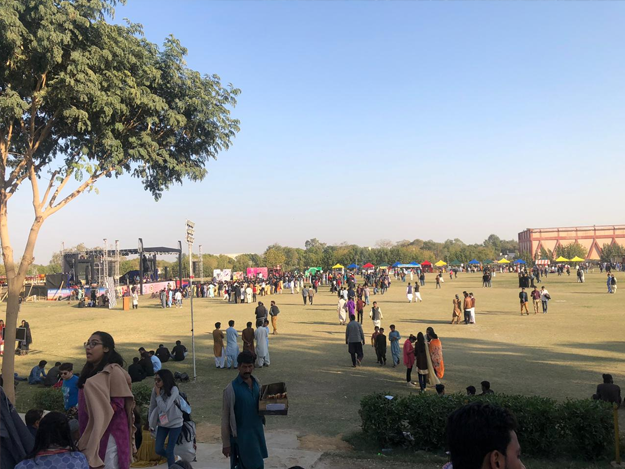 PHOTO: EXPRESS TRIBUNE
PHOTO: EXPRESS TRIBUNE"We (women) are the ones who climb the mountains, we are the ones who bring Oscars home," Obaid-Chinoy stated to cheers from the crowd. "Quaid-e-Azam Muhammad Ali Jinnah once said, 'There are two powers in this world, a sword and a pen. And then there's another one: the power of a woman.' And if we work together, the power of a woman will make Pakistan shine."
Activist and women rights lawyer Nighat Dad shed light on cyber harassment and cyber-bullying. "We've had cases from women about how they receive advances from unknown men online, on social media platforms. What people don't know is that there are laws, strict laws, that can land the harasser in jail for a good amount of time."
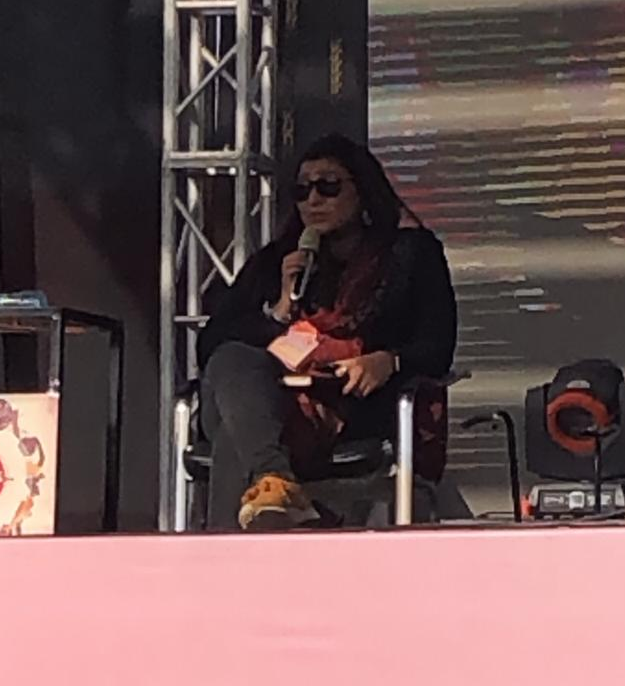 PHOTO: EXPRESS TRIBUNE
PHOTO: EXPRESS TRIBUNEDad has also established a helpline which works anonymously for people looking to complain against cyber-bullying and harassment. "From the complaints we receive, only 60% of them are from women. The rest are from men. But I'm not sure if people would like to talk about it up front. That's the problem. We don't speak out. And speaking out is the need of the hour."
The mental health issue
While Lahooti Melo 2019 event was dedicated to women and most of the sessions revolved around topics directly related to them, there was one session that disappointed, especially considering how important it was.
This was a discussion on mental health which boasted of a panel comprising PR mogul Frieha Altaf, actor-cum-activist Angeline Malik, percussionist and meditation instructor Mohsin Kazi and Coke Studio famed guitarist Omran Shafique. It aimed to discuss topics like depression and the stigma around it in Pakistan but failed to serve its purpose almost completely.
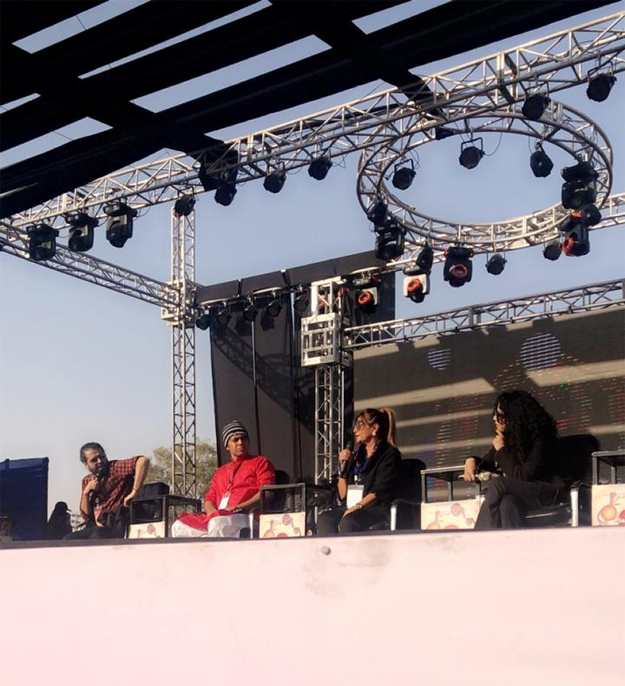 PHOTO: EXPRESS TRIBUNE
PHOTO: EXPRESS TRIBUNE"I've hit rock bottom multiple times," Kazi confessed. "When I was 31 or 32, I was sick and tired of being sick and just tired. But then again, I felt the same way when I was 27 as well." Here, Shafique cut him off laughing, "It's everyday! Sick and tired of being sick and tired!"
"But, I think...," Kazi tried to continue but Shafique, still laughing, went on,"I just realised, I need help!" Altaf just shook her head and Kazi commented, "You shouldn't say this! On such a public forum!"
And it didn't end there. Kazi added, "Someone said to me, 'You know Mohsin, misery is optional. You can come out of it, you are working towards it." The moderator Madeeha Syed inquired, "So, you are saying being sad is a choice, just as being happy is a choice?"
"Sure," Kazi replied. "But at the same time, I don't mean to say clinical depression isn't real. I was suffering with clinical depression as well. The choice to embark on the way to recovery is always mine."
Kazi may have had a point there but the fact remains that people still consider depression and mental illness to be a choice of sorts and many don't agree with that concept. Frankly, the session could have been much more productive if the organisers had invited a mental health professional or two to discuss the causes, solutions and the stigma attached to the topic.
Nonetheless, Lahooti Melo proved to be a success overall, especially in terms of getting its message across. Women are here to stay. And we hope it's only the beginning.
Have something to add to the story? Share it in the comments below.





1732442095-0/Express-Tribune-(3)1732442095-0-270x192.webp)
1732437528-0/Untitled-design-(18)1732437528-0-270x192.webp)
1732434851-0/Untitled-design-(17)1732434851-0-270x192.webp)

1732428506-0/Untitled-design-(5)1732428506-0-270x192.webp)







COMMENTS
Comments are moderated and generally will be posted if they are on-topic and not abusive.
For more information, please see our Comments FAQ